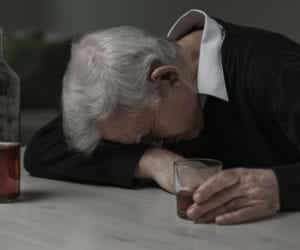The Effects of Alcohol on Older Adults

Alcohol has More Severe Effects on Older Adults
As you age, your body does not metabolize alcohol the same way it did as when you were younger. Those who are older have different health risks as it relates to alcohol consumption compared to those who are younger. Drinking alcohol becomes a health hazard once you are 65 and over due to the fact that:
- Older individuals are more likely to be on prescription medication which alcohol can interfere with
- Those who are older have more health issues which can be exacerbated by alcohol
- Older individuals may have less of a tolerance, therefore, feeling the effects of alcohol much earlier
Older individuals have an increased sensitivity to alcohol which means they experience more severe effects. As a result of drinking, this age group is at a higher risk of injuries as a result of alcohol consumption. Not only this but there are a host of health-related issues that arise when you reach a certain age as alcohol simply has a different effect on the body.
Health Effects of Alcohol
When older individuals consume alcohol, both leisurely and excessively, they are not prioritizing their health. There are increased health problems that come with drinking alcohol when you are older. Some of these include:
- High blood pressure
- Issues with memory
- Mood disorders
- Liver issues
- Osteoporosis
- Heart failure
- Diabetes
- Heart attack
- Stroke
Additionally, those who are prescription medications and drink alcohol may experience negative side effects due to the interaction of the two substances. Not only can mixing alcohol and medication together be dangerous, but it can also be life-threatening. Even something that may seem insignificant such as cough syrup or Advil can prove to be fatal when combined with alcohol and prescription medication. It’s best to consult your doctor in order to know exactly how alcohol and the medications you are taking interact.
It’s important that older adults follow the drinking guidelines properly in order to mitigate any sort of health issues that may occur as a result of drinking.
Keeping Occupied During Retirement
Surveys suggest that retirees often become bored, resulting in their oftentimes abusive drinking patterns. Contrary to what many may believe, a shocking percentage of alcoholics are seniors and the numbers are forecasted to rise in the coming decade. Alcohol abuse among the older generation is prevalent but it is not something that simply occurs once you hit a certain age. Alcohol abuse issues begin early on in an individuals life and can progressively become worse with age.
Emergency room visits, hospital admissions, and admittance to psychiatric hospitals are among the three institutions that eldering individuals are admitted to as a result of alcohol-related or drug-related issues. With an increasing number of seniors consuming alcohol, many refer to alcohol addiction in this age group as an invisible epidemic because the effects are there but oftentimes it does not explicitly obvious.
With less muscle in our bodies and more fact as we age, alcohol is not able to be properly absorbed and distributed, therefore, lingering in our bloodstream. The longer that alcohol stays in our system the more toxic it becomes.
It’s important that if you are struggling with alcohol abuse in your senior years that you get the appropriate help immediately.
If you or a loved one needs help with abuse and/or treatment, please call the WhiteSands Treatment at (877) 855-3470. Our addiction specialists can assess your recovery needs and help you get the addiction treatment that provides the best chance for your long-term recovery.
